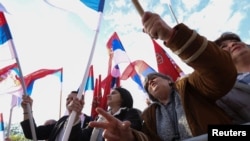Decades-old tensions over the 1995 massacre of 8,000 Muslims during the Bosnian war have been inflamed by a proposed U.N. resolution that would recognize the event as an act of genocide.
Thousands of Serbs marched in protest against the resolution Thursday in Banja Luka, capital of Republika Srpska, the ethnic Serbian entity within Bosnia-Herzegovina, shortly after lawmakers in the entity's legislature adopted a report denying that the killing amounted to genocide.
The proposed resolution advocates for July 11 to be recognized globally as the official International Day of Remembrance for the victims of what it terms the “Srebrenica genocide.” It is expected to come before the U.N. General Assembly for a vote in early May.
The resolution is spearheaded by Germany and Rwanda and backed by the United States, Bosnia-Herzegovina and other nations. It also urges the rejection of any attempts to deny the occurrence of the genocide.
The victims, most of them unarmed, were executed while trying to escape the eastern enclave after it fell into hands of the Bosnian Serb forces on July 11, 1995, according to Reuters, which said that they were killed en masse and that their remains were dug up years later from primary and secondary mass graves.
The Serb forces were commanded by General Ratko Mladic, who was jailed for life in 2017 after being convicted by an international court in The Hague of genocide and crimes against humanity for orchestrating massacres and ethnic cleansing during Bosnia's war.
Bosnian Serb separatist leader Milorad Dodik, addressing the rally in Banja Luka on Thursday, acknowledged that what happened at Srebrenica was a "mistake" and a "huge crime" but insisted "it wasn't genocide.”
Dodik called for Muslim Bosniaks to drop their support for the resolution, saying at the rally that if they did not, Serbs would not live with them in the same state.
Serbian President Aleksandar Vucic said in a statement last week that Serbia would fight against the U.N. resolution.
International courts in The Hague concluded in 2007 that the event was a genocide, the first in Europe since World War II. They also stated that Serbia failed to prevent it from happening.
A 2021 report, commissioned by the Serb Republic government, said that the crimes committed at Srebrenica were not genocide, cited a lower death toll and claimed that the majority of the dead men were killed in combat.
Some information for this report came from Reuters and The Associated Press.









